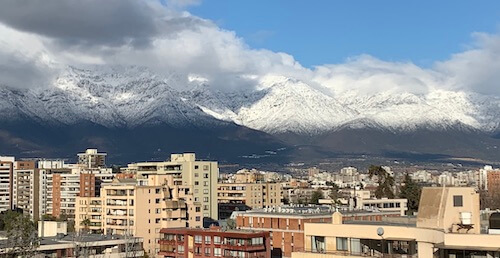 Three months into the Covid lockdown I realised I had absolutely nothing to get up for. No work, nothing to do, nowhere to go. I could dust, perhaps, or do some gardening. But I could feel a tension and a fear telling me that this was it, game over.
Three months into the Covid lockdown I realised I had absolutely nothing to get up for. No work, nothing to do, nowhere to go. I could dust, perhaps, or do some gardening. But I could feel a tension and a fear telling me that this was it, game over.
Work is often erratic as a freelance journalist, and as a woman in my late 50s I’d often wondered how long it could last. Now, as countless publications closed or slashed their budgets, I feared the slow slide into doing a little less each year until I atrophied completely had begun.
Having nothing to do is devastating. I felt useless and irrelevant, particularly as an older white voice in a young black country. Surely I had more to offer the world than that, and the world had more to offer me?
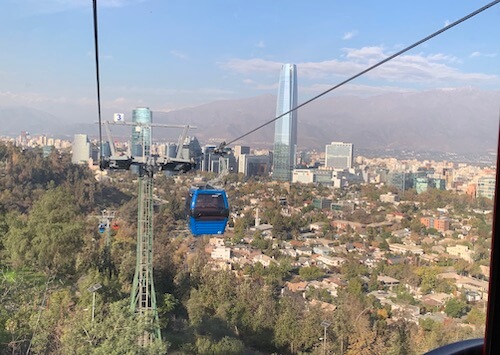 Then one day I hatched a plan. I sat at my desk thinking maybe I should quit journalism and just bum around the world instead. But I want to earn a living and feel useful, so maybe I could work for Club Med and write about all their resorts? No, Club Med would want some young extrovert who knows what TikTok is. I’d have to be the voice of something like Package Holidays for Pensioners.
Then one day I hatched a plan. I sat at my desk thinking maybe I should quit journalism and just bum around the world instead. But I want to earn a living and feel useful, so maybe I could work for Club Med and write about all their resorts? No, Club Med would want some young extrovert who knows what TikTok is. I’d have to be the voice of something like Package Holidays for Pensioners.
Or I could bugger off to Borneo and volunteer at an orangutang sanctuary. Actually, that was already booked and postponed by Covid, but it’s hardly a long-term strategy when I’m allergic to animals. Then I remembered visiting Santiago once and thinking I’d like to live there for a while. I’d even seen an advert for English teachers in a shop window, and I’d joked about applying.
Anxiety about the future began to clear as I pictured myself teaching conversational English to businessmen in Santiago. I’d be enjoying a new culture, forcing my Spanish up to a decent level, and gaining a skill that would last as long as I did.
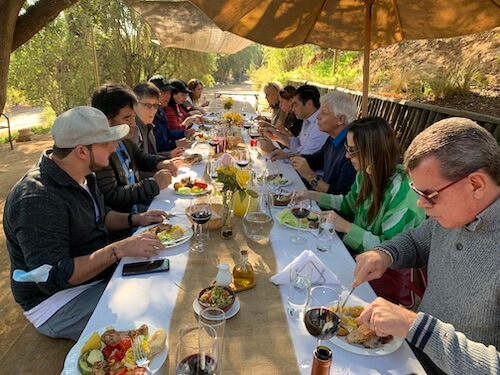 Within two days I’d signed up to study Teaching English as a Foreign Language (TEFL) with a UK company, The Tefl Academy. There are dozens of academies and qualifications, but I picked one with 168 hours of training including a weekend of face-to-face group study to put the theory into practice.
Within two days I’d signed up to study Teaching English as a Foreign Language (TEFL) with a UK company, The Tefl Academy. There are dozens of academies and qualifications, but I picked one with 168 hours of training including a weekend of face-to-face group study to put the theory into practice.
Suddenly I had something to get up for every day, and I could feel my brain sparking into life as I grappled with grammar and how to write a lesson plan. How hard can it be, I thought? I was born English and I’m a journalist.
It’s bloody hard, actually. When I scored a shameful 64 percent for an assignment I’d laboured on for days, I indignantly Googled the jerk who’d scored me so harshly. Oops. He was an Oxford professor in English, so he knew his stuff.
Yet when I completed the course and earned my certification, I just carried on with journalism because work was picking up again. And to be honest, I was terrified of teaching.
A few months later a TELF Academy email arrived listing some job opportunities. There was a vacancy in Santiago to teach conversational English to businessmen.
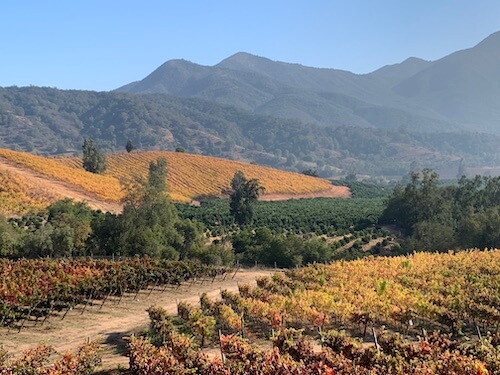 I read it three times, went cold, then clicked on the link to read the requirements. They wanted someone with a degree, and I only have a college qualification in journalism, so I deleted it, half relieved, half disappointed. Until 2am, when I woke up thinking what the hell are you doing, you idiot, that’s the job you visualised. During an online interview the friendly recruiter from Dynamic English told me a degree wasn’t essential, and I got the job.
I read it three times, went cold, then clicked on the link to read the requirements. They wanted someone with a degree, and I only have a college qualification in journalism, so I deleted it, half relieved, half disappointed. Until 2am, when I woke up thinking what the hell are you doing, you idiot, that’s the job you visualised. During an online interview the friendly recruiter from Dynamic English told me a degree wasn’t essential, and I got the job.
Craving Adventure
For anyone who has never lived abroad it might sound hugely daunting. But I’ve done it twice before, which makes it easier. Growing up in England I’d moved cities several times to climb the career ladder. Then when I was married, we’d go on holiday every Christmas and discuss the past year and decide what to do differently next year. One year - looking at a gorilla caged in a zoo in Barcelona - we agreed that we had nice, steady lives, with good jobs, decent cars and lovely holidays. Perfect if we were winding down for retirement, but it felt rather bland for a young couple craving adventure.
The life-changing moment came soon after, when we visited my diplomat brother based in India. We were appalled by the poverty, and an advert in his British newspaper really spoke to us. It was calling for skilled workers who wanted to do something meaningful to volunteer with a charity working in under-developed countries.
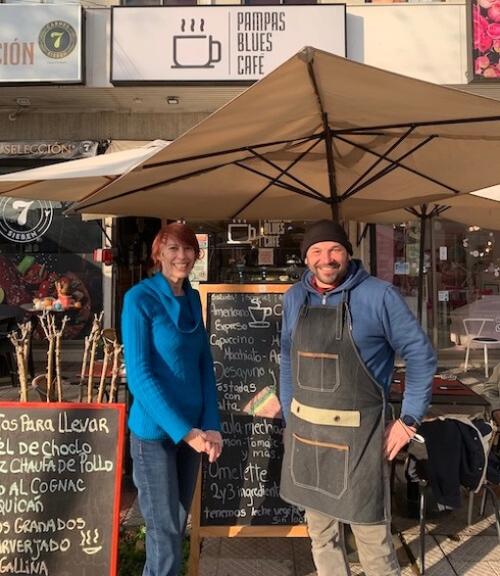 We were posted to Cairo, and I knew from the moment our taxi mounted the pavement to avoid a herd of goats that I’d done with dull, safe England. It was an incredible adventure, although I reckon we gained far more from living in Egypt than the Egyptians ever gained from us.
We were posted to Cairo, and I knew from the moment our taxi mounted the pavement to avoid a herd of goats that I’d done with dull, safe England. It was an incredible adventure, although I reckon we gained far more from living in Egypt than the Egyptians ever gained from us.
My engineer husband was trying to bring a factory up to international standards so it would win foreign contracts. I started freelancing for publications that needed an English-speaking journalist, and ended up editing a technology magazine.
Four years into our adventure I was invited to cover a hi-tech conference in Johannesburg. It was perfect timing. We needed to leave Egypt before its laid-back attitude to work made us unemployable, and I’d always had a crush on South Africa. As a kid, my neighbour used to show me postcards from his son who lived in this mysterious land of flat mountains and exotic Zulu dancers. Now it was 1996, Apartheid had ended, and I flew to Johannesburg with my CV in my suitcase.
Getting a job was easy compared to actually getting work permits to enter the country, and the process took several months. It was worth the effort. We adored South Africa from the moment we landed, and lived a life far better than we ever could in England.
In the intervening years I’ve been widowed, met another amazing man who also died, and made some wonderful friends. But the itchy feet have finally returned.
Unsettling limbo
Thankfully years of dealing with South African bureaucracy and Home Affairs as an expat has prepared me well for the Chilean version, which is remarkably efficient in comparison. It still took eight months to get a year-long visa, and the limbo was unsettling. First I had to get some documents apostilled (certified by the organisation that originally issued it, to prove you didn’t buy it from a hawker in Hillbrow). Getting a police clearance certificate issued and having it apostilled by DIRCO was a long, frustrating and expensive process.
Finally I could submit all the documents and wait. I worried because the police clearance was out of date by the time it came back from DIRCO, but the consulate was lenient. I worried that the decision-makers in Santiago would think I was too old at 59, in a world full of young graduates and experienced teachers half my age.
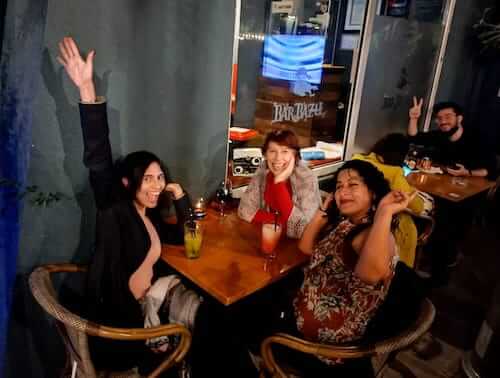 Eventually an email arrived telling me my visa was approved, and I realised I’d been holding my breath for months. The excitement was unbelievable. In a final heart-stopping moment both my credit cards failed when I tried to pay for the visa at the consulate in Pretoria. I was starting to hyperventilate when the lovely Chilean official used her own credit card and gave me her banking details to refund her.
Eventually an email arrived telling me my visa was approved, and I realised I’d been holding my breath for months. The excitement was unbelievable. In a final heart-stopping moment both my credit cards failed when I tried to pay for the visa at the consulate in Pretoria. I was starting to hyperventilate when the lovely Chilean official used her own credit card and gave me her banking details to refund her.
After that it was easy. A friend had already moved in to house-sit, so I booked a flight, bought travel insurance, and found an apartment on Booking.com. I took an overkill approach to money, since you can’t open a bank account in Chile without a local ID card. I got a dollar-denominated credit card, and nervously left the bank with $4,000 in cash stuffed down my trousers. I’m fortunate to have some savings to throw at this life-changing journey, because Santiago isn’t cheap. I doubt my wages will ever cover the rent for my tiny apartment, but the stunning view of the snow-capped Andes is priceless.
Dynamic English assigns me individual students, and now that I know what I'm doing I'm taking on more - but I don’t want to work all day when there’s a whole new country to explore!
And I love it here – I’ve felt myself coming alive again, and it’s exhilarating. Maybe I’ll do two years in Chile then swing up to Mexico. Or Costa Rica, perhaps. I bet that would be a huge adventure.
The Ups
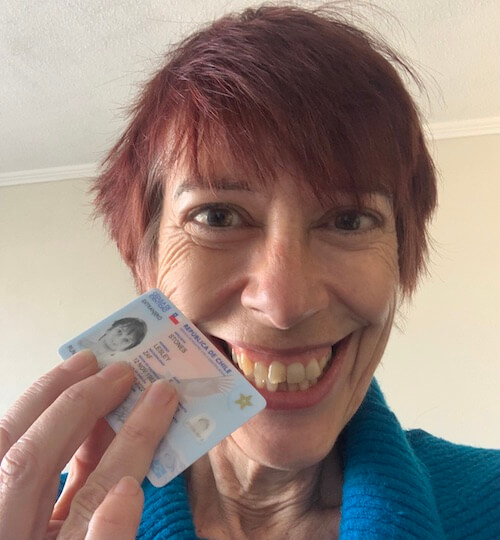 Every day is fresh and exciting, even if I don’t have anything to do. Often I just go for a walk, with every sense tingling as I discover new things and soak up different sights, sounds and smells.
Every day is fresh and exciting, even if I don’t have anything to do. Often I just go for a walk, with every sense tingling as I discover new things and soak up different sights, sounds and smells.
I’m learning valuable skills with the potential to keep me occupied until the end. Mastering a new career is a challenge, but seeing my students gain confidence as they practice and improve boosts my confidence too.
The public transport is excellent, and that’s a daily win. The streets feel safe and lively, and it’s wonderfully liberating to walk home or catch a bus late at night with no sense of danger.
I miss my friends, and making new ones isn’t easy. Luckily many Chileans want to learn English so it’s easy to find language-exchange meet-ups. It’s lovely to walk into a bar and just start chatting to anyone because we’re all there for the same reason. Now I'm a few months in and some real friendships have begun!
The downs
I started to feel a bit of a failure when I walked past restaurants without being bold enough to go in alone. I told myself my late boyfriend Steve (my travel companion for our three years together) would be annoyed at me for dithering. Then I remembered that I’ve started a new career in a new country with a new language, and I know Steve would be incredibly proud. So it’s perfectly ok to eat at home alone, with an amazing view of the Andes.
Navigating the bureaucracy is difficult, especially in a foreign language. Sometimes it’s all a bit much, and there have been tears of helplessness when I can’t figure out how the systems work.
Getting a work visa was just the start. Once I arrived I had to register with the police, then take that registration to the Civil Registrar to get an ID card. With an ID, I could open a bank account. To use a local SIM card I had to register my phone and prove I bought it overseas. Tricky, when I didn’t have a receipt for a second-hand phone bought years ago. Thankfully the staff at Dynamic English have guided me brilliantly, and many of the officials are extremely helpful.
First published in Fairlady Magazine.